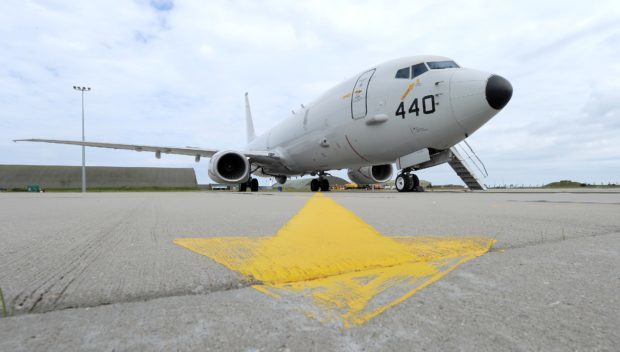Yesterday I had the pleasure of hosting the Secretary of State for Defence Gavin Williamson in Moray as he cut the turf on a £132m facility for the UK’s new fleet of Poseidon Maritime Patrol Aircraft at RAF Lossiemouth.
We are in this position due to the tremendous support local people across Moray, and further afield, gave to campaigners to save the base back in 2010. Eight years later Lossiemouth is one of the RAF’s three fast jet operating bases and preparation is now advanced for the arrival of the fleet of P8 Poseidon aircraft which will be based there.
Clearly the military have been at the forefront of our minds since the chemical weapons attack in Syria and the response from the UK, France and the US last week. Many people have different views on what, if any, involvement the UK should have made. But I was in the Chamber on Monday when the Prime Minister stood at the dispatch box for more than three hours and answered every point from the 140 MPs who questioned her. She then attended two further three-hour debates on Monday evening and Tuesday giving MPs and Parliament the opportunity to hold her and the government to account.
As I say, people will agree or disagree with the decision the Prime Minister took to get involved in this conflict but Parliament has had the opportunity to question how she reached this decision based on the security intelligence which understandably could not have been shared with MPs in a public forum ahead of the strikes.
What we have seen since the action that was taken by the UK, France and the US is strong support from global leaders around the world, but sadly this was not matched by the Leader of the Opposition at Westminster. It’s right that the opposition challenge the government when the facts dictate, but many Labour MPs showed in the Commons their opposition was to their own front bench. Many respected senior figures in the Labour party were openly critical of the position Jeremy Corbyn had taken and were not afraid to say so.
The Prime Minister reiterated that sending members of our Armed Forces into conflict was the gravest decision any leader can take, but we have seen in recent days a Prime Minister that is not willing to sit back and accept the use of chemical weapons and will take action against their use. On the other side we saw the leader of the Labour party who effectively wanted to give the Russians a veto on our involvement.
These conflicts remind us of the commitment and dedication of members of our Armed Forces and when debating Syria in the House of Commons or speaking with personnel at RAF Lossiemouth yesterday their safety and support we provide them has been at the forefront of my mind. With the massive investment the UK government is making in Moray I am sure we are equipping our personnel with the very best equipment and aircraft to allow them to give us the very best protection. Something the RAF have been doing for the one hundred years, and something all our Armed Forces continue to do each and every day.
This week I raised the issue of mobile banking in Moray with the Prime Minister. She joined me in welcoming the decision of RBS to reverse plans to cut the number of mobile bank visits to Dufftown.
She also joined me in calling for far better communication with local communities before any of these proposals are taken forward. Had they done so in the case of Dufftown I’m sure they would have realised how unacceptable and unworkable their plans were.
While it’s welcome news for Dufftown, places like Lossiemouth have still seen their mobile bank visits reduced. This is completely wrong and my colleague on Moray Council, James Allan, has been a strong local voice calling for the mobile bank visits to be increased. He’s right to do this and I fully support him. Lossiemouth is a big community and many local people and businesses rely on the mobile banking service, so to reduce it sends out completely the wrong message.
The Press and Journal has mounted a great campaign against RBS and the proposed bank closures and part of this must also look at how the bank is treating areas that have already seen the local branch close if they then suffers further with a reduction in mobile bank visits.
Readers may be aware that if I’m not making headlines for my politics, my hobby sometimes creates a few column inches. As if being an MP doesn’t make me unpopular enough I enjoy spending Saturday afternoons running up the touchlines at football grounds across the country.
Tomorrows appointment takes me to Dundee for their match against St. Johnstone, and I hope as always the focus falls solely on the players and the game over the 90 minutes.
For players and supporters, we are getting to what they call the business end of the season and for referees it’s no different. It’s been a long season for us all and the end is in sight, but there are some massive games ahead across the leagues, at both ends of the table.
Contrary to what some people think, referees don’t want to be in the limelight, but if big decisions are required you can’t shirk from them either. What is clear about every Premiership match between now and the end of the season is that there is something to play for. And while that makes it entertaining for spectators it’s also demanding for the referees. Love us or loath us (and given the shouts I normally get, I think I know what it is!) we’ll try our best to get the key decisions right as we approach the end of another busy season.
